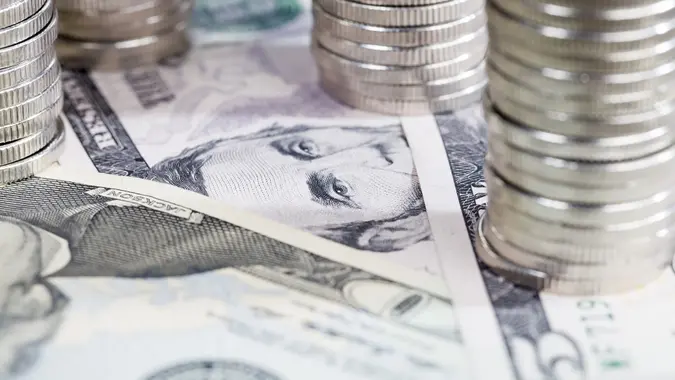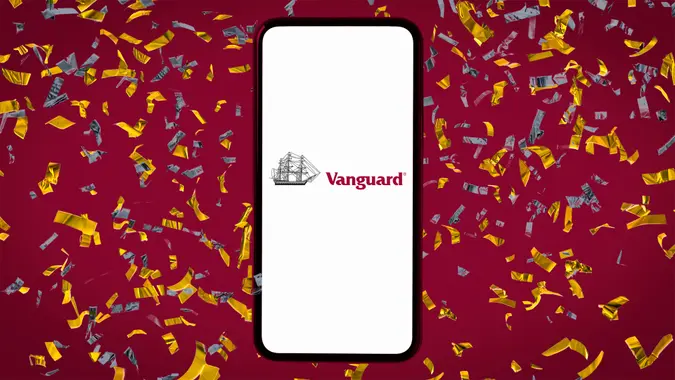CD vs. Savings Account: Key Differences You Should Know

Commitment to Our Readers
GOBankingRates' editorial team is committed to bringing you unbiased reviews and information. We use data-driven methodologies to evaluate financial products and services - our reviews and ratings are not influenced by advertisers. You can read more about our editorial guidelines and our products and services review methodology.

20 Years
Helping You Live Richer

Reviewed
by Experts

Trusted by
Millions of Readers
Although CDs are a type of savings account, there are fundamental differences between the two. Think of CDs as accounts offered with set term lengths. You can access the money without an early withdrawal fee once the term matures. On the other hand, a savings account might be a bit more flexible in terms of when you can access the money.
If you want to learn more about whether you should open a CD vs. a savings account, read on.
What Is a Certificate of Deposit?
A certificate of deposit is a savings account that pays interest and is set for a fixed term. You can open a CD at a bank or credit union, agreeing to keep the money in the institution for a specific time without withdrawing it until it matures.
If you decide to withdraw, you may face financial penalties, depending on the CD type. This system differs from a regular savings account since CDs usually pay higher interest and have varying rules, depending on their type. Different kinds of CDs exist, including:
- Traditional CDs: A standard CD account with a fixed period and fixed interest rate throughout this period.
- High-yield CDs: Online banks with higher interest rates usually offer these.
- Bump-up CDs: CDs that let you increase your interest rate if the rates rise during the CD’s time limit.
- No-penalty CDs: This type of CD lets you withdraw funds without penalty before the CD timeframe ends.
- Jumbo CDs: These accounts have a higher minimum deposit requirement than traditional CDs and usually have higher interest rates.
- Add-on CDs: A flexible type of CD that allows you to add on to the initial amount you have.
What Is a Savings Account?
A savings account is a bank account you can open to save money over time. You can usually open a savings account for as long as you like, receiving a small amount of interest for the funds in your account. The FDIC insures your deposit, and you can withdraw your money — with limitations, depending on the bank or credit union rules.
A savings account is a liquid asset, meaning it’s not difficult to withdraw your money since you won’t wait long or pay high fees. Like CDs, there are different types of savings accounts that you can look into. These include:
- Traditional savings accounts: This is one of the most common types of savings accounts. They do not require a large deposit, but may come with a smaller interest rate.
- Money market accounts: A money market account can offer a higher interest rate and grant immediate access to your money. They do require higher minimum balances and limited monthly transactions.
- High-yield savings accounts: A high-yield savings account comes with a high interest rate, known as an annual percentage yield. However, they may come with mandatory balance requirements and monthly fees.
- Online savings accounts: These accounts allow you to open a savings account online, and the entirety of the account is managed digitally.
- Cash management savings accounts: A cash management account is a type of savings account that’s typically only offered online, and combines features of checking and savings accounts, along with access to investment options.
Key Differences Between CDs and Savings Accounts
Although they may share some similarities, there are key differences between CDs and savings accounts. Here’s an overview:
| Feature | CDs | High-Yield Savings Accounts |
|---|---|---|
| Interest rates | Typically higher than savings accounts; fixed rate for the term | Competitive rates, especially online, but this may fluctuate over time |
| Ease of withdrawal | Low — funds are locked until maturity unless you pay an early withdrawal penalty | High — access your funds at any time, though there may be limits on monthly withdrawals |
| Access to funds | Restricted until maturity; penalties for early withdrawal | Flexible — funds can be accessed without penalty |
| Time commitment | Fixed terms (e.g., 6 months to 5 years) | No set time commitment — ongoing account |
| Best for | Those who don’t need the money immediately or are saving for a specific goal | Those who need access to their funds regularly and want a more flexible savings option |
| FDIC or NCUA Insurance | Yes, up to $250,000 per depositor, per account type | Yes, up to $250,000 per depositor, per account type |
CD Features: Weighing the Pros and Cons
CDs usually come with higher interest rates and fixed returns, allowing you to make safe investments that lead to higher returns than a traditional savings account. CDs allow you to plan for a fixed term, so your earnings are more predictable. They are as safe as savings accounts, as long as the bank or financial institution is an FDIC-insured bank.
Pros of CDs
- Higher fixed interest rates than regular savings accounts
- Predictable returns make them easy to plan around
- Low risk and FDIC- or NCUA-insured
- Great for long-term financial goals where you don’t need immediate access
Cons of CDs
- Early withdrawal penalties apply if you need your money before the term ends
- Funds are locked for a specific period
- You may miss out if interest rates rise during your term
High-Yield Savings Account Features: What Are the Pros and Cons?
People who can benefit most from high-yield savings accounts are those looking to set money aside for future use. Parents can also open savings accounts for children and teens or use them to save for college.
Here’s a breakdown of some of the pros and cons:
Pros of High-Yield Savings Accounts
- Easy access to funds when needed
- Interest compounds frequently
- Often no early withdrawal fees
- Great for emergency or short-term savings
Cons of High-Yield Savings Accounts
- Interest rates can fluctuate and may be lower than CDs
- Some accounts require minimum balances to earn interest or avoid fees
- Monthly transaction limits may apply
When To Choose a CD Over a Savings Account
Choosing a CD over a savings account may be the better option when you have a fixed goal that you’re saving for and won’t need the money until later.
Combining CDs and Savings Accounts
You can adopt a hybrid strategy and combine CDs and savings accounts. You can use a savings account for immediate or emergency needs, since they have better flexibility. At the same time, you can invest in CDs and wait until maturity to earn higher fixed returns.
Making the Right Choice for Your Money
When deciding whether to open a CD vs. a savings account, the most important factors to consider are when you need your money, the purpose of the account, interest rates and what penalties your bank imposes in case you need to withdraw.
If you’re still unsure, you might want to speak with a financial advisor, who can guide you through the process as you’re looking at all of your options.
Questions To Ask Before Deciding
Before deciding between a CD and a savings account, there are a few questions you might need to ask yourself, such as:
- Do you need to access money whenever you need, or are you OK with putting aside money for a set span of time?
- Are your life circumstances stable, and are issues likely to arise in the future?
- Have you evaluated interest rates and the overall economic environment?
- Is it worth choosing banks with the lowest penalties for early withdrawal if your life circumstances are unstable?
- Did you compare different interest rates and terms between institutions?
By doing so, you can make the most from your returns while aligning your financial strategy with your circumstances.
CDs vs. Saving Accounts: FAQs
If you are looking for more answers, take a look at some of the most commonly asked questions about CDs and savings accounts.- What is the safer option, CDs or savings accounts?
- Both CDs and savings accounts are safe when they are issued by a bank that's insured by the FDIC or a credit union insured by NCUA. The differences lie in how quickly you can access your funds. A savings account lets you withdraw without penalty at any time, whereas a CD matures after the term period, where you can decide what to do with the funds. Otherwise, if you need the funds before the CD matures, you may need to pay an early withdrawal penalty fee.
- What yields higher returns, CDs or savings accounts?
- CDs usually yield higher returns than savings accounts because they have higher interest rates. The exchange is that you lock in your money for a fixed term.
- Can banks enforce policies on how much I can withdraw from a savings account or CD?
- Yes, banks can limit how much you withdraw from your savings account or CD. Although these terms differ between banks and there are federal regulations, you can expect banks and credit unions to set their own policies as well.
- Are CDs the best way to ensure I get a high return?
- Not necessarily. Although CDs often offer more attractive interest rates than savings accounts, they might not always provide the best returns. The rate of return depends on the length of the term, interest rate and any penalties for early withdrawal. A savings account or high-yield savings account could be more flexible overall, and other investment types, such as stocks, bonds and others, could offer even better returns, depending on how the market performs.
Virginia Anderson, Caitlyn Moorhead and Gail Kellner contributed to the reporting for this article.
Our in-house research team and on-site financial experts work together to create content that’s accurate, impartial, and up to date. We fact-check every single statistic, quote and fact using trusted primary resources to make sure the information we provide is correct. You can learn more about GOBankingRates’ processes and standards in our editorial policy.
- Chase. "Are there different types of CDs?"
- Citizens Bank. "What is a savings account, and how does it work?"
- Washington Trust. "Which Type of Savings Account is Best for You?"
 Written by
Written by  Edited by
Edited by 

























